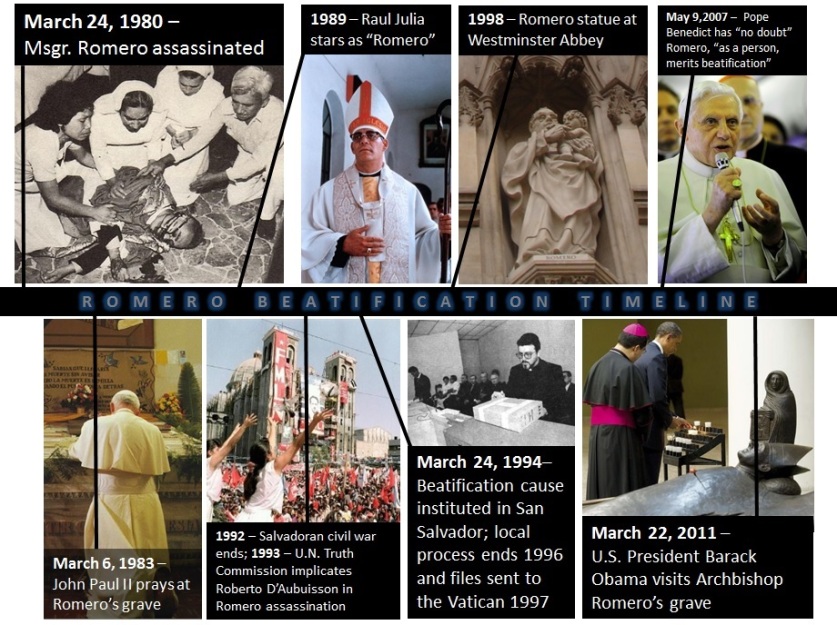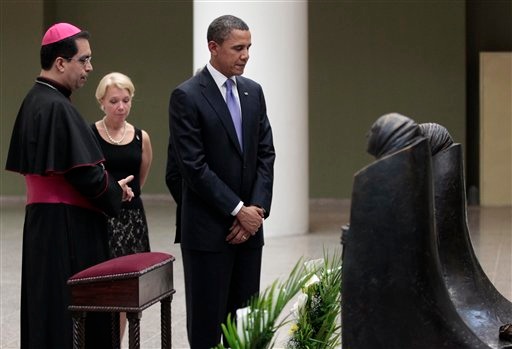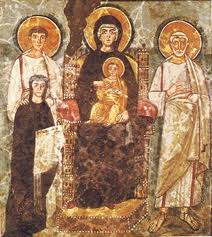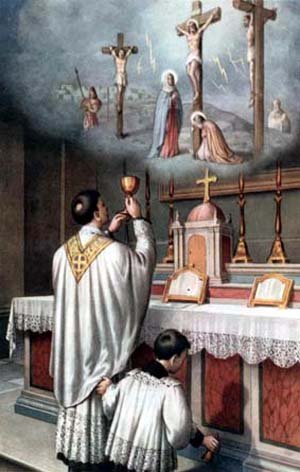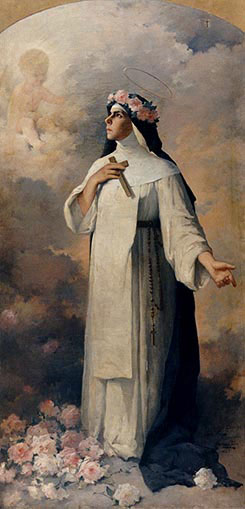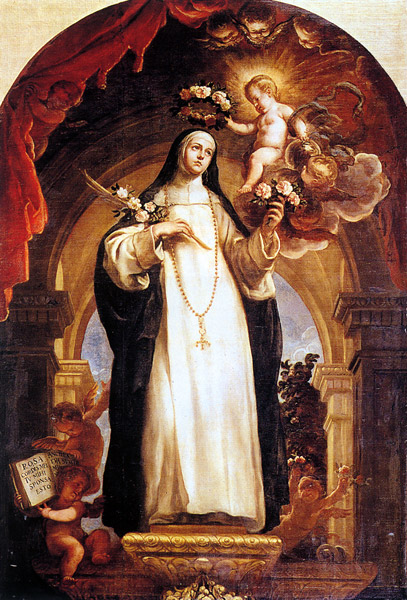 St. Rose of Lima, Virgin
St. Rose of Lima, Virgin
Saint Rose, the first canonized saint of the New World, was born at Lima in 1586. She received the name of Isabella in Baptism, but one day her mother saw a beautiful rose drooping over the baby’s cradle and ever afterwards called her Rose. She was an obedient child; her mortifications were most severe. She prayed worked, and wept for the conversion of sinners; she excelled in her love for holy purity. She lived a life of simplicity and prayer in a small hut in a corner of her father’s garden; the birds would visit her and sing with her the praises of God. The Savior frequently appeared to her. Her devotion to the Passion of Our Lord was remarkable as were her own sufferings. Her bed was strewn with glass shards, with nails and thorns; she wore chafing hair-cloth; her head was crowned with painful thorns skillfully concealed by roses. She died August 26, 1617. Her Office was written by the eminent Cardinal Bona.
Sts. Felix and Saint Adauctus, Martyrs
The holy martyrs Saint Felix and Saint Adauctus. St. Felix suffered martyrdom in the year 303, and was joined by Adauctus, who shared his martyr crown. There is a painting, which we have not been able to find to scan, from around the sixth century which depicts both of them with the priestly tonsure. Felix is an old man, but Adauctus stands on the right hand side, although he is young and beardless.
________________________________
Dom Gueranger, Liturgical Year
What perfume from beyond the ocean breeze brings us today! Former world renews his youth in these scents from heaven; the new is reconciled by them the earth and the heavens.
One hundred years have passed since the days astonished Europe learned a new continent proved beyond the waves of the Dark Sea, fright browsers. Spain had expelled Crescent its own land; as a reward, she was given the task of planting the cross on these great tracks. Neither hero nor apostles, were lacking in this work the Catholic kingdom; nor, unfortunately for him, adventurers whose thirst for gold was the scourge of the Indians that they were bringing to the true God. If the speedy decline of the illustrious nation that had triumphed over the Moor, will soon show how much the people accused of the highest blessings yet remain supportive of the crimes committed under the guise of their name, who carries the flag of the country . We know how to Peru ended the Inca Empire: despite the indignant protests of the missionaries, despite orders from the mother country, a few years sufficed to fellow Pizarro to kill a third of the inhabitants of these successful countries; another third had finished perish in misery worse than an immediate death servitude; the rest fled into the mountains, taking in the forests hatred of the invader, and too often, alas! Gospel, head in his eyes the atrocities carried out by the baptized. Greed winners gave access to all the vices in those souls which, however, remained high faith: Lima, founded at the foot of the Cordilleras as a city of the conquered provinces, seemed built on the threefold concupiscence; before the end of the century, a new Jonas new Nineveh, St. Francis Solano threatened the wrath of God.
But mercy had already taken the lead; justice and peace had met in the soul of a child ready for any atonement insatiable love. How we would like to stop and contemplate the Peruvian virgin in his heroism that always ignored in His grace so innocent and pure! Rose who had for those who approached as fragrant sweetness, and kept it secret for spines which do not go without the roses down here! Blooming smile of Mary, she delights the Child God who wants his heart. Flowers to recognize the queen, and every season sees the answer to his desire; his invitation, plants stir happy, trees bend their branches, all nature trembles themselves insects organize choirs, birds compete with her harmonies to celebrate their common origin. And she sings, remembering the names of his father and his mother, Marie Gaspard Flower and Olive: “O my Jesus, you are fine between olives and flowers; and do not despise your Rose!”
However, the eternal Wisdom was revealed in the games of the Holy Child and his beloved. This is Clement X who in the bull of canonization, reminds us that one day when she was more ill, the amiable son of the Blessed Virgin invited to a mysterious part where the issue would be left to the free choice of winner. Rose wins and needs his healing, immediately granted. But Jesus asks the other hand, and winning the second round, he makes his pain, accompanied by the gift of patience, joyfully losing; because she realized she was earning more in the second half than the first.
Reserve to the church to tell, in the Legend, how far our Saint was brought by the effectiveness of these divine lessons related suffering. Into superhuman torture of his last illness, she answered that exhorted to courage: “What I ask my husband is that he does not cease to burn me with the most bitter ardor until I am the ripe fruit for him to deign to receive this land to its table of two.” And as we then surprised his safety, his certainty of going straight to heaven, she said another word that this fire also shows an entire aspect of his soul: “I have a husband who can that ‘there is bigger, has there has rarer; and I do not see myself hoping for him small things. “
Well justified by the infinite goodness, insurance and kindness of the Lord toward Rose trust. She was only thirty-one years, when, in the middle of the night opened the feast of St. Bartholomew in 1617, she heard the cry, Behold the Bridegroom! In Lima, throughout Peru, in the whole of America, and wonders of grace and conversion signaled the demise of the humble virgin, previously unknown large number. “He was legally certified, said the Supreme Pontiff, that since the discovery of Peru, no missionary had met who had produced such a shock universal penance.” Five years later, the monastery was dedicated to St. Catherine of Siena, which was to continue in the middle of Lima’s sanctifying work, sanitation, social protection, and called the Monastery of Rose, because that it was indeed before God the founder and mother. His prayers had obtained the erection she had predicted for after his death, designating in advance the plan, the religious future, the first top, it invests one day prophetically of his mind in an embrace of mystery.

Feast of Saint Rose of Lima, Virgin / Commemoration of the holy martyrs Saint Felix and Saint Adauctus
Double/ White Missa “Dilexísti justítiam”
INTROIT: Ps. 44: 9
Thou hast loved justice, and hated iniquity: therefore God, thy God, hath anointed thee with the oil of gladness above thy fellows.
Ps. 44: 2
My heart hath uttered a good word: I speak my works to the King. Glory be to the Father and to the Son and to the Holy Ghost, as it was in the beginning, is now and ever shall be, world without end. Amen. Thou hast loved justice, and hated iniquity…
COLLECTS
Almighty God, the giver of all good gifts, who, by the outpouring of the heavenly dew of thy grace, didst enable thy blessed Saint Rose to shew forth among the peoples of the Indies the glory of chastity and suffering: grant to us thy servants, that running after her in the savour of her sweetness, we may be made a sweet savour unto Christ our Lord. Who liveth and reigneth with thee, in the unity of the Holy Ghost, ever one God, world without end. R. Amen.
Second Collect of Ss. Felix and Adauctus, Mm
O Lord, we humbly beseech thy majesty: that, like as thou dost ever gladden us with the remembrance of thy Saints; so thou wouldest evermore defend us with their supplications. Through Jesus Christ, thy Son our Lord, who liveth and reigneth with thee, in the unity of the Holy Ghost, ever one God, world without end.
EPISTLE: II Cor. 10: 17-18; 11: 1-2
The Lesson is taken from the Epistle of St. Paul to the Corinthians
Brethren: He that glorieth, let him glory in the Lord. For not he that commendeth himself is approved, but whom the Lord commendeth. Would to God ye could bear with me a little in my folly: and indeed bear with me. For I am jealous over you with godly jealousy: for I have espoused you to one husband, that I may present you as a chaste virgin to Christ.
GRADUAL: Ps. 44: 5-6
In thy comeliness, yea in thy beauty: go forth, ride prosperously, and reign.
ALLELUIA: Ps. 44: 16
Alleluia, alleluia. Virgins shall be brought after her unto the King: her neighbours shall be brought unto thee. Alleluia.
GOSPEL: Matthew 25: 1-13
The continuation of the Holy Gospel according to St. Matthew.
At that time: Jesus spake unto his disciples this parable: The kingdom of heaven be likened unto ten virgins, which took their lamps, and went forth to meet the bridegroom. And five of them were wise, and five were foolish. They that were foolish took their lamps, and took no oil with them: But the wise took oil in their vessels with their lamps. While the bridegroom tarried, they all slumbered and slept. And at midnight there was a cry made, Behold, the bridegroom cometh; go ye out to meet him. Then all those virgins arose, and trimmed their lamps. And the foolish said unto the wise, Give us of your oil; for our lamps are gone out. But the wise answered, saying, Not so; lest there be not enough for us and you: but go ye rather to them that sell, and buy for yourselves. And while they went to buy, the bridegroom came; and they that were ready went in with him to the marriage: and the door was shut. Afterward came also the other virgins, saying, Lord, Lord, open to us. But he answered and said, Verily I say unto you, I know you not. Watch therefore, for ye know neither the day nor the hour.
OFFERTORY: Ps. 44: 10-11
The daughters of kings have made thee glad in thy glory. Upon thy right hand did stand the queen in a vesture of gold, wrought about with divers colours.
SECRET
May the Sacrifice of thy holy people be acceptable unto thee, O Lord, for the honour of thy Saints: through whose merits they know that they have received help in tribulation. Through Jesus Christ, thy Son our Lord, who liveth and reigneth with thee, in the unity of the same Holy Ghost, ever one God, world without end.
Second Secret Prayer of Ss. Felix and Adauctus
We beseech thee, O Lord, to look down in mercy on the offerings of thy people: that, as we do devoutly offer this our service to the honour of thy Saints, so we may be profited thereby to the salvation of our souls. Through Jesus Christ, thy Son our Lord, who liveth and reigneth with thee, in the unity of the same Holy Ghost, ever one God…
COMMON PREFACE
It is very meet, right, and our bounden duty, that we should at all times, and in all places give thanks unto thee, O Lord holy Father almighty, everlasting God; through Christ our Lord. Through whom the angels praise, the dominations adore, the powers, trembling with awe, worship thy majesty: which the heavens, and the forces of heaven, together with the blessed seraphim, joyfully do magnify. And do thou command that it be permitted to our lowliness to join with them in confessing thee and unceasingly to say:
Sanctus, Sanctus, Sanctus, Dóminus Deus Sábaoth. Pleni sunt cæli et terra glória tua. Hosánna in excélsis. Benedíctus qui venit in nómine Dómini. Hosánna in excélsis.
COMMUNION: Matth. 25: 4 and 6
The five wise virgins took oil in their vessels with their lamps. And at midnight there was a cry made, Behold, the bridegroom cometh; go ye out to meet Christ the Lord.
Thou hast filled Thy household, O Lord, with sacred gifts; ever comfort us, we beseech Thee, through her intercession whose festival we celebrate. Through our Lord Jesus Christ, Thy Son, Who liveth and reigneth with Thee in the unity of the Holy Ghost, God…
Second Postcommunion of Ss. Felix and Adauctus
Filled with Thy sacred gifts, O Lord, we beseech Thee that, by the intercession of Thy saints, we may pass our lives in giving thanks to Thee. Through our Lord Jesus Christ, Thy Son, Who liveth and reigneth with Thee in the unity of the Holy Ghost, God…
_______________________________________
Divine Office – Matins before 1960
The Lesson is taken from the Book of Ecclesiasticus
4, 23-28
My son, observe the time, and beware of evil. For thy soul’s sake be not ashamed to speak the truth. For there is a shame that bringeth sin; and there is a shame that bringeth glory and grace. Accept no person against thy person, nor a lie against thine own soul. Fear not thy neighbour when he falleth, and refrain not to speak when there is occasion to do good. Hide not thy wisdom in her beauty.
Lesson ii – Chap. 4, 29-32
For by speech wisdom is known, and understanding, and knowledge and instruction by the word of him that understandeth, and firmness by works of righteousness. In no wise speak against the truth, but be abashed for the falsehood which thou hast uttered through ignorance. Be not ashamed to confess thy sins, and make not thyself an underling to any man by thy sin. Strive not against the person of the mighty, and contend not against the course of the river.
Lesson iii Chap. 4, 33-36
Strive for righteousness with all thy soul, and contend for righteousness unto death, and God shall beat down thine enemies for thee. Be not hasty in thy tongue, and in thy deeds slack and remiss. Be not as a lion in thine own house, troubling thy servants, and oppressing them that are subject unto thee. Let not thine hand be stretched out to receive, and shut when thou shouldest give.
Lesson IV –St. Rose Of Lima
The first flower of holiness which came to full blossom in South America, was the maiden Rose. She was born at Lima, of a Christian father and mother, and was remarkable from her childhood for marks of saintliness. The occasion of her name was a strange likeness to a rose, which her face assumed when she was a babe. To this name she afterwards added that of the Virgin Mother of God, desiring to be called St. Mary’s Rose. At the age of fifteen years she uttered a vow of perpetual virginity. As she grew older, lest her parents should force her to marry, she polled her head of all her hair, which was very beautiful. She fasted to a degree almost superhuman, passing whole Lents without taking bread, and eating day by day only five pips of a lime.
Lesson v
She took the habit of the Third Order of St. Dominic, and then doubled her former severities. She wore a long and very rough hair-cloth, into which she inserted small pins. She wore day and night under her veil a crown, the inner side of which was armed with pricks. In imitation of the hard steps of St. Catherine of Siena, she girded her loins with a threefold iron chain. She made to herself a bed of knotty sticks, and filled the gaps with broken bits of potsherd. She built herself a very small hut in the farthest corner of the garden, where she gave herself up to thoughts of heavenly things, and to punishing her body with often scourging, starvation, and sleeplessness. But she waxed strong in spirit, and though she often had to fight with evil ghosts, she conquered them, fearlessly prostrated them, and triumphed over them.





